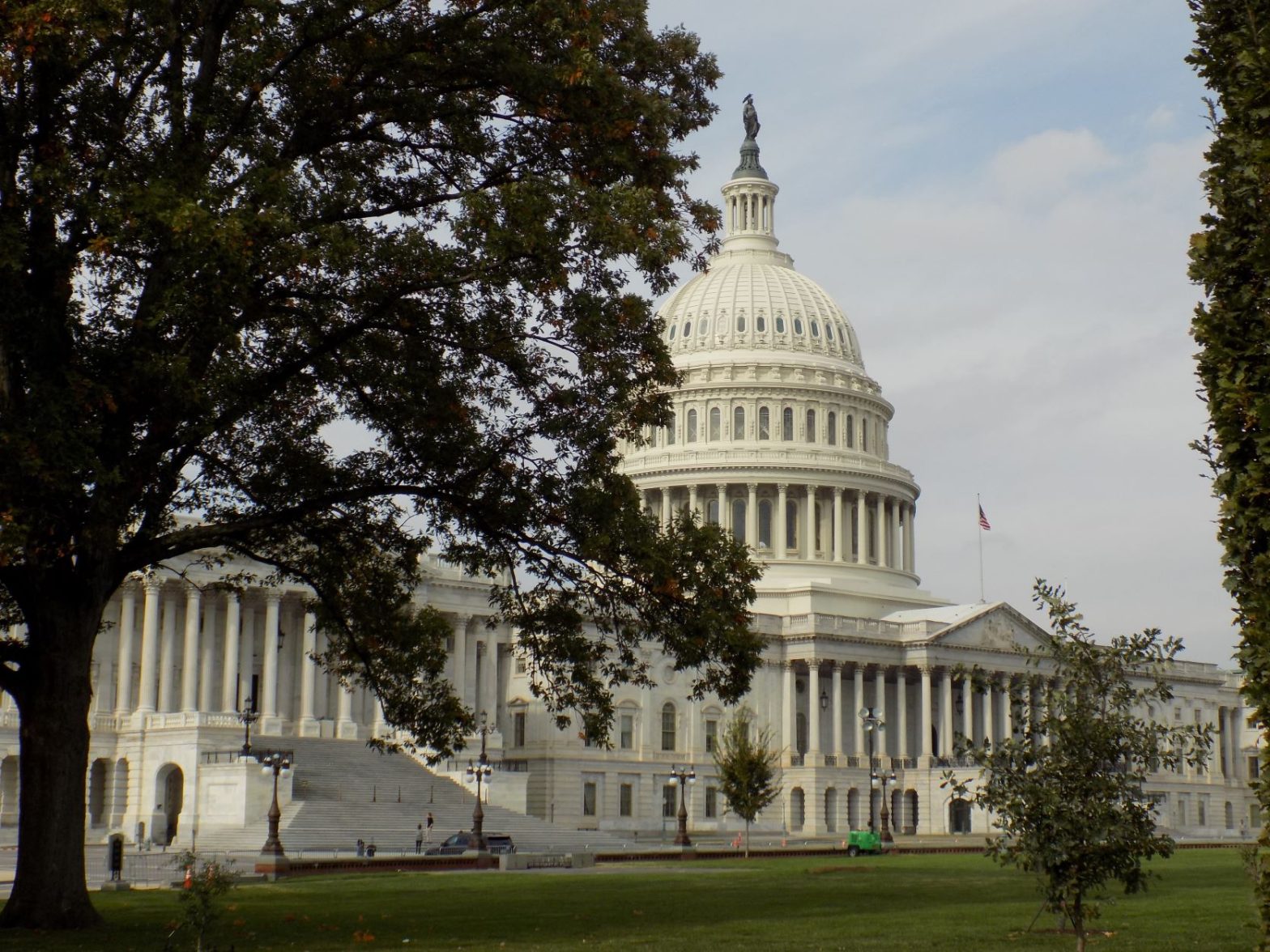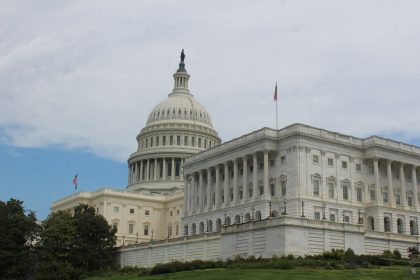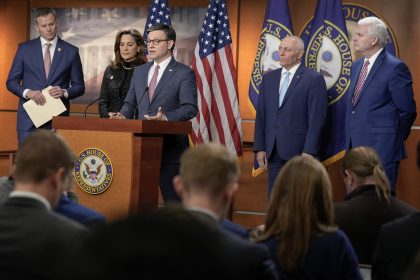House Democrats Release Mammoth Plan for Boosting Competition With China

WASHINGTON — House Democrats late Tuesday night released the America COMPETES Act, a mammoth, 2,912-page bill aimed at boosting high tech research and ending, once and for all, the semiconductor crisis that has caused rippling supply chain disruptions and put a serious, if temporary, crimp on American competitiveness.
The long-awaited bill is the House’s answer to the United States Innovation and Competition Act of 2021, a bill sponsored by Sens. Chuck Schumer, D-N.Y., and Todd Young, R-Ind., which the Senate passed in June 2021 with a bipartisan vote of 68-32.
Among other things, the USICA, formerly known as the Endless Frontier Act, would authorize $110 billion for basic and advanced technology research over a five-year period. Investment in basic and advanced research, commercialization, and education and training programs in artificial intelligence, semiconductors, quantum computing, advanced communications, biotechnology and advanced energy amounts to $100 billion. The act also provides $10 billion to designate 10 regional technology hubs and create a supply chain crisis-response program.
Among the highlights of the America COMPETES Act is $52 billion in semiconductor funding sought by both the White House and a bipartisan group of congressional lawmakers to combat the ongoing computer chip shortage.
It also authorizes the expenditures of $45 billion to improve our nation’s supply chains and strengthen the economy and national security by preventing shortages of critical goods and ensuring that more of these goods are made in the United States
The House version of the bill also includes a number of funding provisions for science and technology research aimed at upping America’s competitiveness against China.
It goes a step further by also trying to improve the playing field upon which the Indo-Pacific competition is playing out.
One way the House bill does this is by increasing State Department resources devoted to the region, while extending support to regional and international organizations to boost multilateralism and adherence to a common set of rules.
In a statement from the White House, President Joe Biden said, “The House took an important step forward today in advancing legislation that will make our supply chains stronger and reinvigorate the innovation engine of our economy to outcompete China and the rest of the world for decades to come.”
But he also acknowledged the America COMPETES Act includes a number of provisions that were nonstarters for the Senate last summer and will likely continue to be so now. Nevertheless, the president suggested he sees achieving a compromise between the House and Senate bills as nothing less than a victory for the economy and the country as a whole.
“The proposals laid out by the House and Senate represent the sort of transformational investments in our industrial base and research and development that helped power the United States to lead the global economy in the 20th century and expand opportunity for middle-class families,” Biden said. “They’ll help bring manufacturing jobs back to the United States, and they’re squarely focused on easing the sort of supply chain bottlenecks like semiconductors that have led to higher prices for the middle class.
“Building on the historic investments in the bipartisan infrastructure law that I signed last year … comprehensive competitiveness legislation will power our economy to create good-paying jobs for all Americans, no matter where you live or whether you have a college degree, and will help tackle the climate crisis,” he said.
“I’m heartened by Congress’ bipartisan work so far, and its commitment to quick action to get this to my desk as soon as possible,” Biden said. “Together, we have an opportunity to show China and the rest of the world that the 21st century will be the American century — forged by the ingenuity and hard work of our innovators, workers and businesses.”
House Majority Leader Steny Hoyer, D-Md., said Tuesday night that the House bill “represents a generational commitment to America’s technological edge, to our research and development, and to our economic competitiveness and the culmination of years of work on the Make It In America plan that I’ve been proud to lead since 2010.”
“This bill will help secure our supply chains, ensure the microchips and semiconductors that have become vital in an increasingly digital world are made here in America, promote the advanced research to fuel an entrepreneurial spirit that is the envy of the world, and expand career apprenticeships to prepare our workers for jobs they will create,” he said.
“I am particularly proud that we are moving forward with legislation that would enact the bulk of House Democrats’ Make It In America plan for jobs and opportunity. The plan I first launched 12 years ago has focused on three core areas,” Hoyer said. “Number one, education and skills training; two, infrastructure; and three, entrepreneurship.
“The bipartisan infrastructure law we enacted last year included much of the Make It In America plan’s infrastructure recommendations. Now, we are advancing the rest of our plan with this legislation. Make It In America has truly been a product of collaborative action by House Democrats from across our caucus, developed in recent years through hearings, listening tours, and meetings with labor, with businesses, with economists and with local government leaders from across the country.”
House Speaker Nancy Pelosi said in a written statement that The America COMPETES Act “reflects a whole-of-House effort, involving the deep expertise of chairs, members and staff across our committees to produce a historic bill that will be most effective at strengthening our competitiveness at home and abroad.”
“Now is the time to recommit to boldly and strategically investing in our nation’s future, and to do so in a way that strengthens the supply chain, lowers costs and ensures that America can out-compete any nation, today and for decades to come,” she said.
“Under the leadership of Science, Space and Technology Committee Chair Eddie Bernice Johnson, the House has led a rigorous and comprehensive process to forge results-focused solutions that will power research that will ensure a prosperous future for our nation. Major components of this package have already passed the House with overwhelmingly bipartisan votes, and we look forward to conferencing this bill with the Senate to get legislation to the president’s desk as soon as possible,” Pelosi said.
While there are any number of provisions Senate and House Republicans won’t like — a section by section breakdown can be found here — two in particular seem like they’ll encounter significant headwinds as the bill reconciliation process goes forward.
The first is a proposal that would amend current tariff laws and do away with the de minimis value for low-value packages that arrive in the U.S. from non-market economies like China.
That policy change alone could raise the duties on hundreds of millions of packages each year
The other provision likely to raise eyebrows is one that would establish a government screening protocol for American investments in unfriendly nations like China.
That provision, known as the National Critical Capabilities Defense Act, was left out of the Senate bill after intense lobbying by the business community.
The New Democrat Coalition, the House’s largest ideological caucus, is already calling for swift passage of the bill.
“New Dems know that this legislation is a golden opportunity for Congress to solve the problems Americans are facing and set America up for success in the future,” said New Democrat Coalition Chair Suzan DelBene, D-Wash.
“Now is the time to invest in U.S. innovation to lead the global economy, uphold and write the rules of the international order, strengthen our global supply chains, and spur domestic high-tech manufacturing of critical technologies like semiconductors and microchips. Doing so will grow our economy, cut costs for Americans, and fight long-term inflationary pressures,” she said in a written statement.
The legislation has also gotten an affirmative nod from those in the tech manufacturing industry.
“In order to compete globally, America needs bold, bipartisan action that spurs innovation, creates good-paying jobs, and helps communities thrive across the country,” said Linda Moore, president and CEO of TechNet, a bipartisan network of tech industry CEOs and senior executives.
“Federal investments will ensure America’s businesses and workers have the tools, resources, and firepower needed to compete globally, and that the United States remains the best place to start and grow a business,” she said.
“We are glad to see movement on this legislation in the U.S. House of Representatives and are encouraged by the commitment that leaders in the House and Senate have shown to advance this bill and invest in American innovation, increase opportunities for U.S. workers, and strengthen our global competitiveness,” Moore added.
Dan can be reached at [email protected] and at https://twitter.com/DanMcCue.























